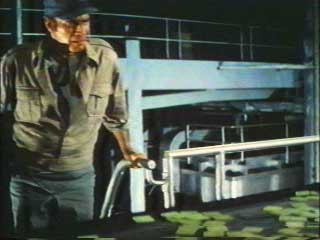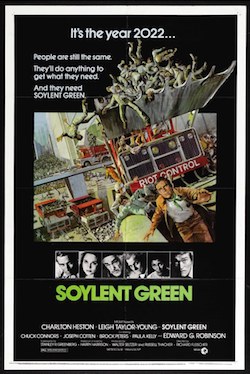Soylent Green was the first science fiction movie I saw with a law enforcement officer as the hero. I’d seen scientists, square-jawed military men, even everyday folk driven to heroism by events. But if cops were present, they were either sacrificed to demonstrate the power of the villainous forces, or like the military—narrow-mindedly opposed to the heroes’ sensible ideas. In other words, even when monsters and aliens were involved, cops were still The Man.
And no one is more The Man than Charlton (a.k.a. Moses, Ben-Hur, Michelangelo, El Cid) Heston. This was the period when Heston, ending his era as a leading man and moving into character parts, cannily played against his epic hero status (nowhere done better than in the original Planet of the Apes). Here he’s Thorn, a cop on the edge (of boredom), part of an overworked and underfunded New York City force that essentially goes through the motions out of habit more than a desire to serve and protect. When a rich industrialist is murdered, Thorn’s investigation consists mostly of raiding the dead man’s apartment for goodies he can’t afford on his policeman’s salary. No one questions this; it’s become that kind of world.
Later, when the obligatory call to close the investigation comes down because Thorn’s gotten too close to the truth, he defies his superiors and continues, because This Time It’s Personal. As the implications of global scandal and disaster become clearer, the audience doesn’t worry: after all, if anyone can get to the truth and stop the evildoers, it’s the man who split the Red Sea and painted the Sistene Chapel. And nothing about Heston’s performance indicates any irony: he’s playing straight, and serious, and heroic.
Yet when he discovers the truth, by following the body of his best friend from the suicide center to its eventual processing, you suddenly realize he can’t fix it. Just as in The Parallax View and Chinatown, two of the best-known nihilistic endings from the era, knowing the truth does Thorn absolutely no good. Not even Heston can solve this dilemma. And if a problem is bigger than Ben-Hur, it’s damn sure a big problem.

It takes an effort of will to watch the movie now without the knowledge of its climactic line—which has become both a cliche and a punch line—ruining the suspense. Sure, some things about Soylent Green are cheesy (part of that era’s standard approach of SF films made for fans, but not by them), but I’ve always found the flaws worth overlooking. And if you can manage it, you’ll find a serious film genre mashup and an actor playing against his public persona to great effect.
Alex Bledsoe, author of the Eddie LaCrosse novels (The Sword-Edged Blonde, Burn Me Deadly, and the forthcoming Dark Jenny), the novels of the Memphis vampires (Blood Groove and The Girls with Games of Blood) and the first Tufa novel, the forthcoming The Hum and the Shiver.










